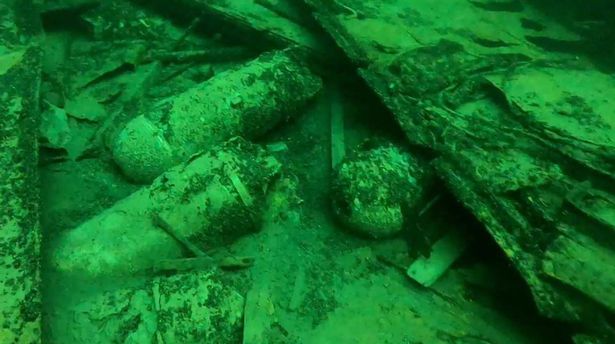26/05/2023
“If you ever come across anything suspicious like this item, please do not pick it up, contact your local law and/or enforcement agency for assistance”.
Storyline: Delta & Echo Squadron
Royal Navy divers are making vital Baltic Sea shipping lanes safer by recovering unexploded mines and torpedoes as part of a NATO security mission. Specialist divers are involved in a multinational explosive ordnance disposal (EOD) exercise hosted by Latvia, operating closely alongside the hosts and teams of experts from Estonia, Lithuania, Germany, Belgium, Canada and the United States. Delta Squadron of the Diving & Threat Exploitation Group safely recovered two ground mines and one torpedo two days into the exercise, already increasing the safety of the region. “The aim is to continue our close working relationships and to make the sea lanes safer by identifying and disposing of historic maritime explosive ordnance, much of which is a legacy of WWII,” said Chief Petty Officer James Roberts. “All nations are working together, contributing to the planning, identification, confirmation and recovery of explosive ordnance, building operational capability and increasing the ability to operate as a coherent task group.” The aim of the exercise – codenamed Open Spirit – is to clear the Baltic Sea from sea mines, torpedoes, and other explosive remains from both World Wars and the Cold War. The Baltic was the scene of heavy fighting during these conflicts and were heavily mined, while air bombardments, naval gunfire and submarine warfare only added to the ordnance lying on the seabed. The dangerous ordnance is hunted using cutting-edge autonomous underwater vehicles – submarine robots packed with the latest sensors that creates images of the underwater objects. Each piece of ordnance removed, and every inch of the seabed mapped, ultimately makes the region safer and helps the Baltic nations understand their own backyard – ensuring they are able to spot changes if new mines are laid. CPO Roberts added: “From the most junior seamen to senior operators, working closely with our partners and allies demonstrates the resolve and commitment of the UK and all NATO to regional Baltic security and the principles of collective defence. “It’s fantastic to be working with our friends in the Baltic again, this constant drumbeat of exercise allows real relationships to grow, bound by our shared values, stronger together and ready to defeat aggression.” Exercise Open Spirit has taken place since 1997 and rotates between Estonia, Latvia and Lithuania.
Photo-Source: royalnavy.mod.uk
If you find anything that appears to be an explosive device, do not touch it, leave it where it is and call the police. We will contact the appropriate agencies to properly dispose of the item.
Dear editors, Biography of a bomb is aimed at highlighting the danger caused by unexploded bombs. Moreover, the most important aspect is that we work completely non profit, what drives us is raising awerness about this topic. We make use of your pictures and articles, but we need them to put a context in how findings are done. We trust in your understanding. We will (and we always do) cite the source and the author. We thank you for your comprehension.





